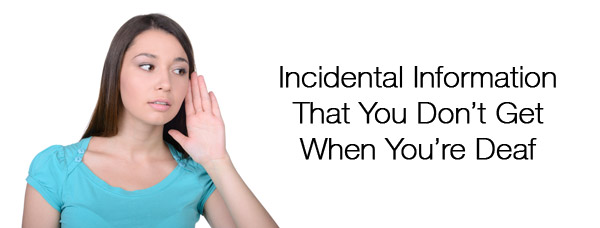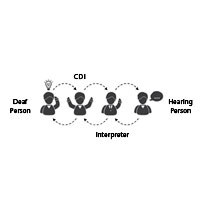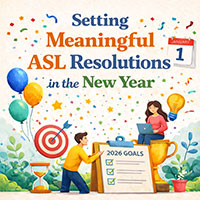
Incidental Information You Don't Get when You're Deaf
Hearing people have access to “incidental information” all the time. They overhear conversations, they hear comments and remarks on the radio and television. Even background noises count as incidental information. This is called “hearing privilege.” You don’t even think about it happening because it just does. How often can you actually pinpoint the exact moment you learned a new piece of information? Most of us forget where or how we came by the knowledge we have. We just know what we know.
Here are some examples of when hearing people get information that deaf people do not:
- When a hearing person laughs at something someone said.
- When hearing students (in a mainstream class) are talking about random things.
- When an announcement is made over the PA system.
- When you overhear a conversation at another table or in the next room.
- When you can overhear 5 or 6 conversations at the same time around you and you can tune in or out of any conversation you want.
- When interpreters (because of speed or skill) drop information.
- When elementary school kids listen to what middle school or high school kids say on the bus.
- An announcement on the radio.
- A commercial on TV (not all commercials are captioned).
- Overhearing co-workers' answers to clients' questions.
- Comments between teachers and interpreters.
- Every time a deaf student looks down to write notes they miss information from the interpreters.
- What your kids are doing in the next room: closet doors opening, cupboards closing, water running, zippers zipping, tiptoeing up the stairs, giggling.
- Hearing your keys drop, an alarm go off, a phone ring or a knock on the door.
- Appliance alarms - like the beeping noise letting you know the refrigerator door was left open, the dishwasher is done, or the washing machine is finished.
- Pets and their many noises - cats, dogs, birds, horses, and more!
When communicating with the deaf, make sure you are aware of this incidental information and do your best to keep them in the loop.
Can you think of other examples of incidental information? Share your thoughts in the comments below.
ADVERTISEMENTS
 Marta Belsky is Deaf and a third generation ASL user. She has been teaching ASL for over 35 years and enjoys sharing her native language with new users. She has a Bachelor's degree from Gallaudet University and a Masters in Deaf Education from Western Maryland College. She has taught ASL at multiple universities, coordinated interpreter services at a major university, and is a co-owner of Signing Savvy.
Marta Belsky is Deaf and a third generation ASL user. She has been teaching ASL for over 35 years and enjoys sharing her native language with new users. She has a Bachelor's degree from Gallaudet University and a Masters in Deaf Education from Western Maryland College. She has taught ASL at multiple universities, coordinated interpreter services at a major university, and is a co-owner of Signing Savvy. Interpreter Q & A: When Interpreters Omit Information
Interpreter Q & A: When Interpreters Omit Information Interpreter 4-1-1: Certified Deaf Interpreters Explained
Interpreter 4-1-1: Certified Deaf Interpreters Explained Short Film from CNN Highlights a Deaf All-American Family
Short Film from CNN Highlights a Deaf All-American Family







Savvy User PamelaFriday, August 1, 2014
By the same token, I think that the deaf have it better sometimes in all the things they CAN'T hear every day like all the subtle or non-subtle racist things that get said to me or around me or about me on a daily basis. Sometimes I envy Helen Keller in all the things she COULDN'T hear that didn't make her angry and pissed off and hate the entire world all the time everywhere she went. Not so much sexism in my case as racism. It's gotten worse over the last two decades and I'm beginning to envy the deaf more and more. They don't have to "try to ignore it." They didn't hear it in the first damned place.